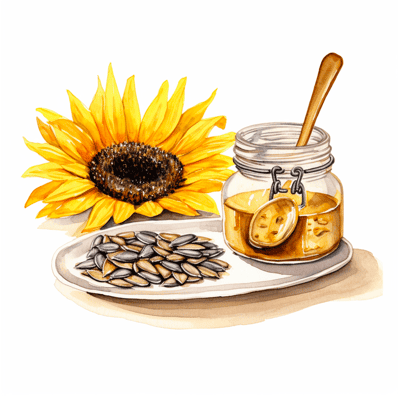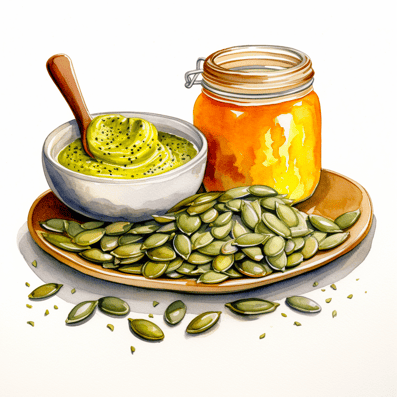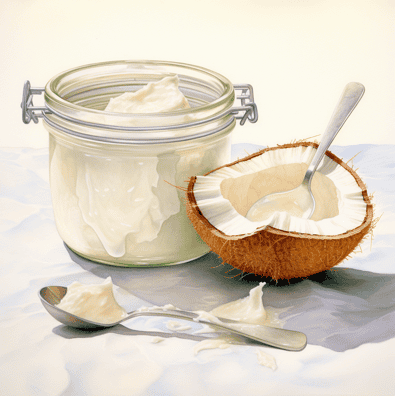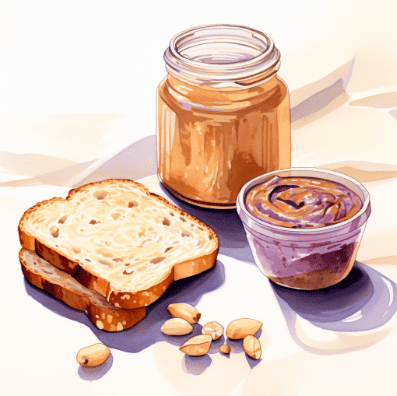
Finding a safe and satisfying best almond butter substitute nut allergy can feel like a game changer. Especially when struggling with tree nut allergies and missing that creamy spread of almond butter on your favourite snack. We are going to go through popular nut-free swaps and which alternatives are best for different occasions.
Hi, I’m Hazel
I gave up on skincare after years of issues with acne and sensitive skin.
But after going plant-based, my skin cleared up and even started to glow. Now I help women reveal their natural beauty with simple, delicious plant-based food.
I also used to be a nurse, and love nerding out on nutritional science (high-quality science, that is).

As usual, this post is based on the strongest nutritional evidence I could find with a focus on the simplest, most delicious foods
…because who has time to waste on actions that don’t work?
The quick version:
Sunflower seed butter, pumpkin seed butter, and tahini are excellent substitutes for almond butter if you have nut allergies. They offer similar textures and flavors, making them perfect for smoothies, baking, and spreads without risking your health.

Sunflower Seed Butter – Nut-free champion

For an alternative that tastes great and keeps your allergy worries at bay, sunflower seed butter is a good option. It’s everything you need to replace almond butter without the allergens:
- Taste: Slightly sweet with a nutty flavour from the key ingredient of sunflower seeds. Sunflower seed butter is reminiscent of your beloved almond butter.
- Texture: Creamy and smooth, just the right consistency for spreading or blending.
- Perfect For: Spreading on toast, blending into smoothies, or using as a dip for fresh fruit.
Pumpkin Seed Butter: Nutrient powerhouse

Pumpkin seeds make a delicious almond butter alternative that packs a nutritional punch. In fact Pumpkin seed butter might just be your new favourite. Here’s why it’s worth trying:
- Taste: This flavour profile is earthy with a slightly sweet flavour, offering a refreshing change from the usual nut butters.
- Texture: Rich and slightly grainy, providing a robust mouthfeel that’s both satisfying and different.
- Perfect For: Enhancing the flavour of your oatmeal, spreading on whole-grain bread, or adding to your salad dressings.
Tahini: The savoury choice

If your palate leans towards savoury, tahini—made from sesame seeds—is a great option. It brings a lot of character to the table:
- Taste: Deeply nutty flavour with a savoury edge, making it a standout in flavour profiles.
- Texture: Luxuriously smooth and runny, ideal for drizzling over dishes.
- Perfect For: Creating rich dressings for your salads, mixing into hummus for extra creaminess, or incorporating into your favourite savoury dishes.
Coconut Butter: The exotic alternative

For those who enjoy a hint of tropical taste, coconut butter offers a unique flavour. It transforms ordinary meals into exotic treats:
- Taste: Naturally sweet and coconutty, it’s quite different from traditional nut butters, adding a touch of island flair to your dishes.
- Texture: Creamy and slightly gritty, providing a rich consistency that’s perfect for certain recipes.
- Perfect For: Spreading on pancakes, adding to tropical smoothies, or using in dessert recipes for a flavourful twist.
Hemp Seed Butter: The protein-packed option
Hemp seed butter is a non-nut butter that brings nutrition, health benefits and a mild taste to the table, ideal for those who prefer a less intense flavour:
- Taste: Subtly nutty with an earthy undertone, less pronounced than other nut butters, making it versatile in various dishes.
- Texture: Creamy yet slightly coarse, offering a unique sensory experience.
- Perfect For: Boosting protein in smoothies, stirring into yogurt for a power breakfast, or as a quick, nutritious spread on toast.
You may also like:
How to Choose Between Chia, Flax, and Hemp Seeds
Soy Nut Butter: The protein-rich swap
Explore soy-nut butter for a safe and nutritious alternative that’s remarkably akin to traditional nut butters:
- Taste: Mild and slightly sweet, akin to a less intense version of peanut butter, making it a seamless swap in many recipes.
- Texture: Smooth and creamy, with a similar texture to almond butter.
- Perfect For: Use in sandwiches, as a base for baking cookies, or mixing into your protein shakes.
Peanut Butter: The legume alternative

While not suitable substitute for everyone, especially those with peanut allergies, peanut butter is the most obvious swap in place of almond butter:
- Taste: Rich and robust, offering a stronger flavour that’s both familiar and comforting.
- Texture: With a richly creamy texture from a high fat content, very similar to almond butter, making it an excellent substitute in almost any recipe.
- Perfect For: Classic peanut butter and jelly sandwiches, baking delicious treats, or crafting savoury sauces.
You may also like:
Peanut Butter & Acne: Is it Your Friend or Foe?
The best substitute for…
Here’s a list of common uses for almond butter and a great substitute for each, along with explanations of why they work the best:
Smoothies
Best Substitute: Sunflower Seed Butter
Why: Sunflower seed butter has a creamy texture and a mild, slightly sweet flavour that blends well in smoothies without overpowering other ingredients.
Sandwich Spreads
Best Substitute: Soy Nut Butter
Why: Soy nut butter’s smooth, creamy texture and mild flavour make it an excellent substitute for almond butter in sandwiches, providing a similar mouthfeel and taste.
Baking Cookies and Cakes
Best Substitute: Pumpkin Seed Butter
Why: Pumpkin seed butter has a rich texture and a sweet, nutty flavour adding depth when you bake desserts. It also maintains moisture similar to almond butter for a similar result.
Dressings and Sauces
Best Substitute: Tahini
Why: Tahini has a runny texture and a rich, nutty flavour that makes it perfect for blending into dressings and sauces, providing a savoury depth that complements a variety of dishes.
Dips and Spreads
Best Substitute: Hemp Seed Butter
Why: Hemp seed butter has a creamy texture and a mild, nutty taste, making it ideal for dips and spreads where a subtle flavour is beneficial.
Oatmeal or Yogurt Mix-ins:
Best Substitute: Coconut Butter
Why: Coconut butter offers a sweet, creamy addition to oatmeal or yogurt, providing a rich flavour and texture that enhances breakfast dishes with a tropical twist.
Energy Bars or Protein Snacks:
Best Substitute: Peanut Butter (if no peanut allergy)
Why: Peanut butter’s high protein content and creamy texture make it excellent for energy bars or protein snacks, providing lasting energy and satisfying taste.
These substitutes not only mimic the texture and consistency of almond butter but also complement the flavours of the dishes in which almond butter is typically used, all while avoid tree nuts and food allergies.
Almond butter substitute nut allergy
Finding the best alternatives in the situation of an almond butter substitute nut allergy doesn’t mean you have to compromise on taste, texture, or nutritional benefits. Whether it’s sunflower seed butter, pumpkin seed butter, or one of the other delightful spreads we’ve explored, you can enjoy these nut-free options confidently and safely as long as you don’t also have a peanut allergy. Dive into these alternatives and find your new favourite to enhance your diet and continue to support your health and beauty goals.
References
Most references below will link to the original peer-reviewed study itself. However, sometimes I will link to a video over at NutritionFacts.org instead, which is by far the single best resource of brutally transparent nutritional evidence you will ever see. Dr Greger tells a great story about the realities of the science and if I think you will benefit more from one of his videos, the link will take you there instead.
Happy nerding!